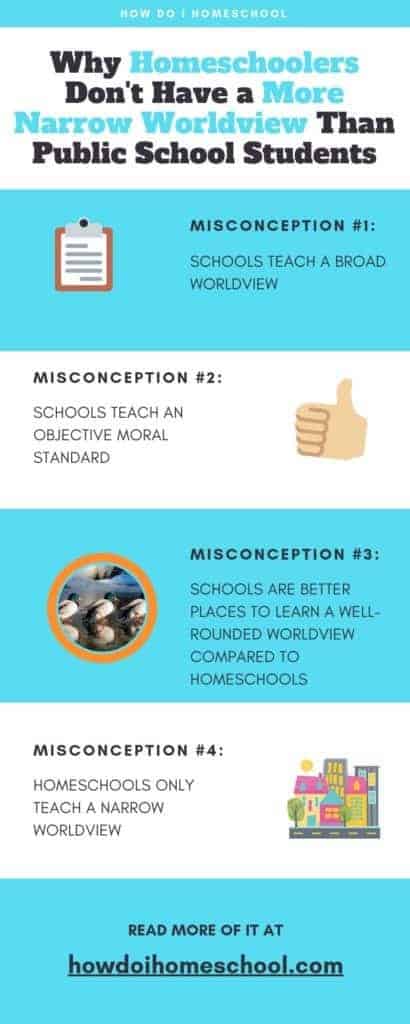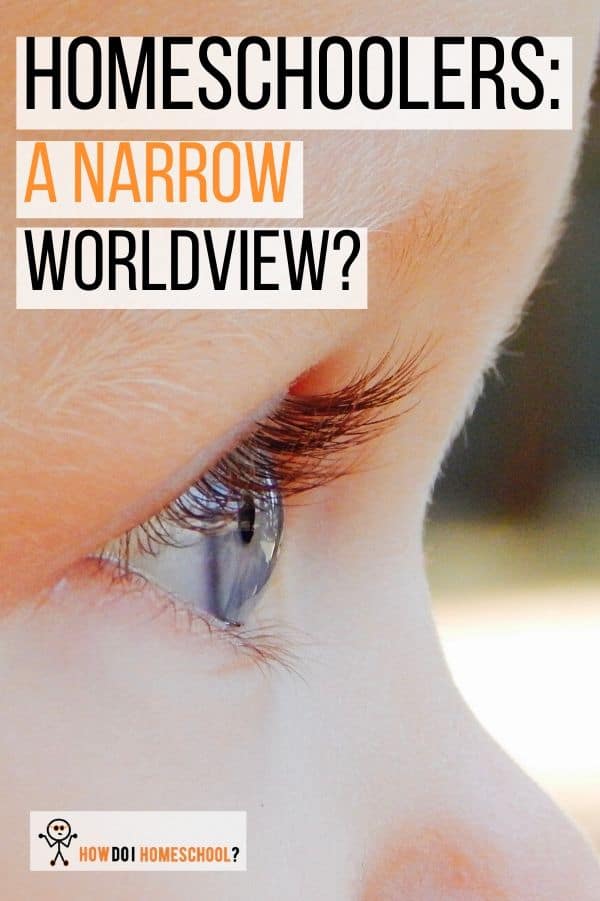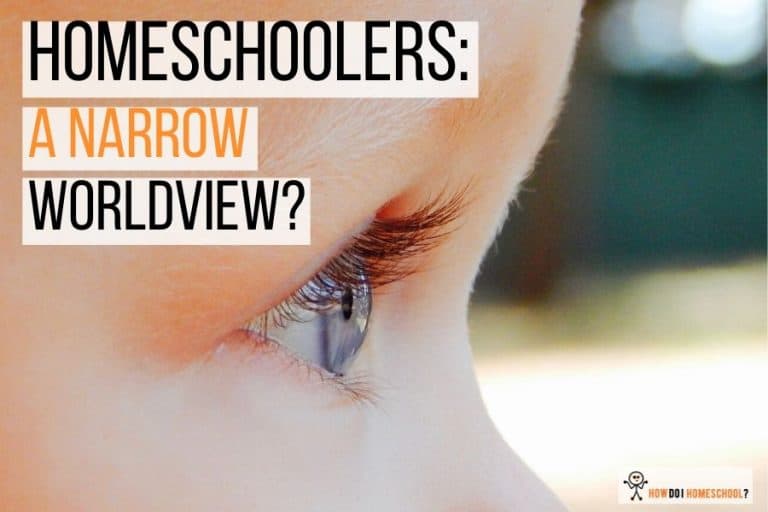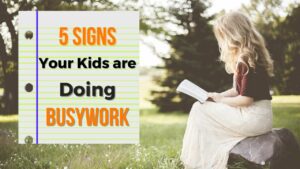Many people believe that if you homeschool your children, they will grow up with a narrow worldview, unable to operate effectively on a planet full of diverse philosophies. A narrow worldview, critics say, won’t prepare home educated students for when they encounter different perspectives as they enter the ‘real world’ later in life (that is, a workplace or college setting). Indeed, one of the recent comments submitted to this website was:

I hope you enjoy reading this blog post. If you want to do my course on how to homeschool, click here.
“Aren’t homeschoolers being raised not fully understanding or grasping the concept that its a very diverse world with usually more than one way to fix whatever problem they encounter? [sic]”
Comments like these reveal a few common misconceptions about schools (we’re going to assume it’s public school we’re talking about) and homeschools.

Misconception #1: Schools teach a broad worldview
Many schools really teach an incredibly narrow worldview and adopt that perspective throughout their subjects. The worldview adopted by almost all public schools is an anti-Christian, left-wing philosophy.
You can gather this for yourself by looking at the values of many teacher’s unions. (In some cases, to be a part of these unions, you have to agree with their values.)
For example, public school’s in Victoria have to subscribe to the Labour funded Safe Schools program (an LBTIQ+ program dressed up to look like an anti-bullying program).
The worldview in public schools is so narrow that no public school curriculum would ever teach the reasons why some people are opposed to their views. For instance, although these institutions teach evolution, they don’t seriously dedicate time to fairly setting out a good account of creationism and the proof behind it. Similarly, these schools are happy to teach children about condoms and abortion but don’t seriously allocate time to teach them that sex inside a marriage relationship is favored by some due to its many advantages.
Parties and individuals opposed to public school ideology are simply called bigots. If you ask me, this seems more like a narrow worldview. (For more on this, read Chapter 6 – Worldview Assumptions in Why on Earth Homeschool.)
Misconception #2: Schools teach an objective moral standard
Schools are as subjective as homeschools are. That is, they teach from a biased perspective, just as every homeschooling parent gives their child a biased perspective.
If you have people involved, no matter their level of education or government clearance, the curriculum is always going to be slanted towards that person’s or committee’s common beliefs. You will most likely be either pro-abortion or anti-abortion, pro-‘safe-sex’ or anti-‘safe-sex’, pro-Christianity or anti-Christianity.
If you’re a human being, you simply won’t be able to produce an objective (non-biased) view of things. This is because to be a person is to be a subjective being.
And, when you enter a public school, you will almost always (unless your teacher happens to be a Christian) hear an anti-Christian subjective worldview taught.
Misconception #3: Schools are better places to learn a well-rounded worldview compared to homeschools
The Curriculum and Teachers
Some think homeschools don’t teach diverse worldviews as children only have two parents, often with similar views, teaching.
Critics of homeschooling reason it’s far better to send your children to school so they can experience a broader worldview. After all, the school curriculum has many different people with different views teaching the courses.
Indeed:
- your science teacher is obviously going to teach you about Creation as well as Evolution. [No…oh, they’ll only teach you evolution…]
- your sex-ed teacher will teach you about the pros and cons of abstinence before marriage, right? [No…oh, they probably won’t because they don’t know it themselves…]
- the curriculum will have both pro-Christian and anti-Christian sources speaking [No, actually, they mostly use sources from people ‘who don’t create too much division’…and they think Christians are divisive… which is fair enough…Christianity isn’t exactly a ‘kum ba yah’ session if you look at it closely.]
The Peers
Of course, your peers aren’t always going to give you much of a well-rounded point of view either. They will probably be just as confused as you are.
Furthermore, they’re being trained to believe everything they hear in school. This means they’ll be teaching you the values they’ve just learned in that curriculum we talked about above…the one that doesn’t give us as much of a diverse worldview as we thought).
But, where you might be learning a different worldview is from the children who are raised in Christian or other religious or non-religious homes.
So, if your friend comes from a Christian home and talks about his belief in God during science class, your child might learn about another worldview…if he’s listening.
Similarly, if your friend comes from a Wiccan family, you might learn an alternative worldview where you learn how to use an Ouija board to seek answers to your questions.
As you can see, a broad worldview isn’t always a good thing!

Misconception #4: Homeschools only teach a narrow worldview
I think it would be wrong to say homeschools teach the broadest worldview on offer. But, it wouldn’t be wrong to say a lot of them are as broad as many schools.
For instance, my father taught me arguments for and against many hot topics in our society. You can do that in a homeschool. But in a public school, you probably won’t learn many (especially in the detail we were taught it).
When my children are old enough, I plan on enrolling them in a debating school. In a debating school, you’re handed a piece of paper that tells you which side you’re going to argue for on a specific debate.
For instance, if you’re discussing abortion, you might be handed a paper that tells you will be representing the pro-abortion side even if you’re anti-abortion.
Although you might be anti-abortion, representing the pro-abortion side makes you recognize and learn the arguments many people hold when they argue for abortion. This makes you understand them better and anticipate the arguments you’ll be engaging with.
Yes, some homeschools do teach a narrow worldview, but…
Personally, I don’t want my children to be learning about sex or Wicca at age 10.
Yes, I realize I can’t ‘shelter’ them forever. But I want a chance to teach them the correct way to deal with a lot of bad stuff, instead of them having to blunder through it themselves. (I also think this will lessen a lot of heartaches they might have to go through as well – and no, this isn’t resilience training. Indeed, we need a better understanding of that word!)
I think that, so long as you teach your children how to deal with hot topics, a narrow worldview for a time, can be beneficial.
And, even if kids find out a lot of this stuff for themselves when they’re older, I don’t think it’s going to exactly ruin them for life.
Conclusion
If a teacher were to try to represent an ‘unbiased worldview’ to a student in school, they might find themselves fired. While home educators shouldn’t argue homeschools don’t always have a narrow worldview, they can certainly argue homeschools don’t have a more narrow worldview compared to schools, particularly public schools. Educating children at home gives parents an opportunity to present both sides of the argument, instead of only representing one perspective.



